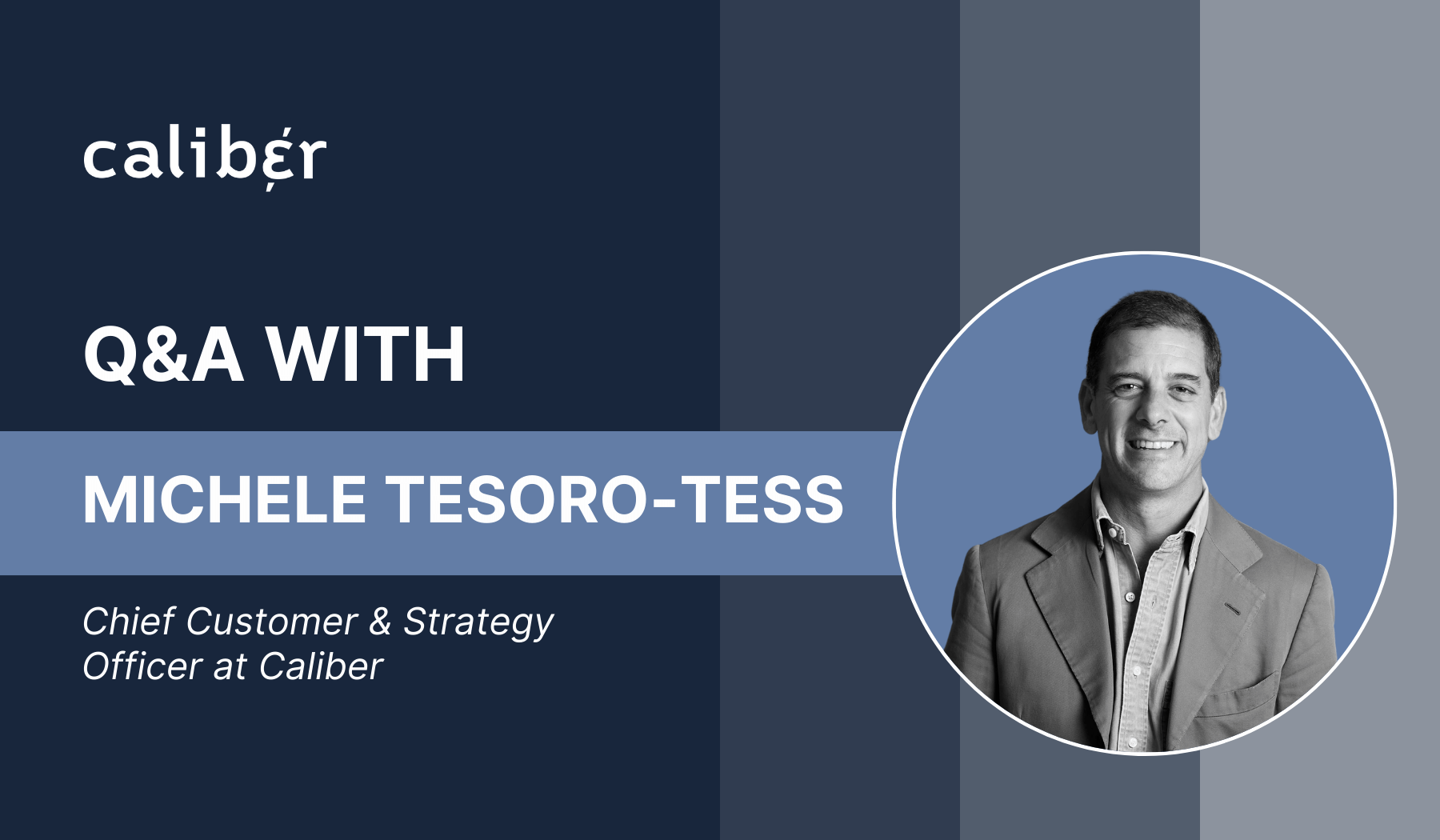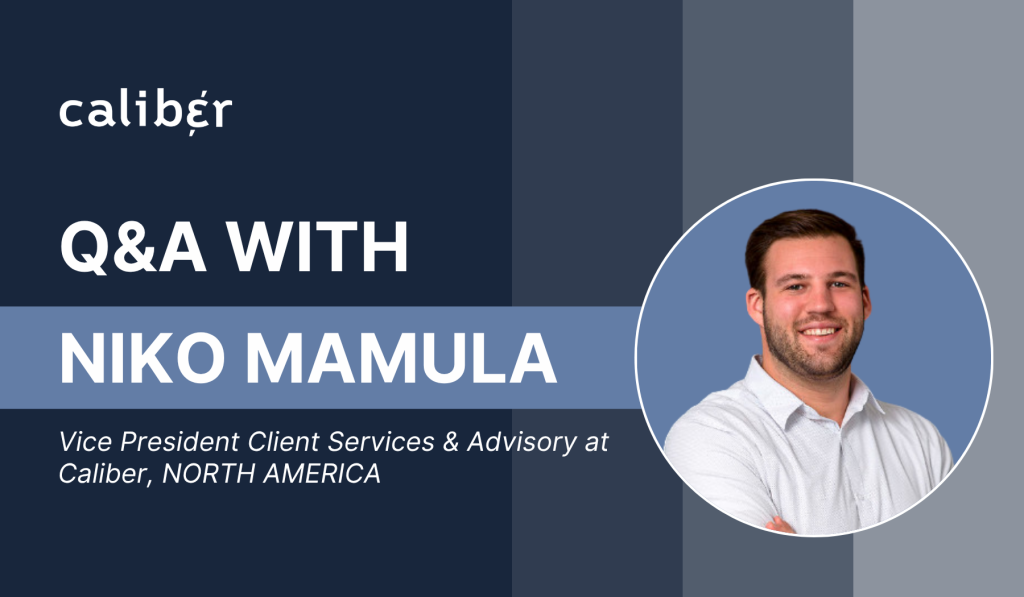

Niko Mamula joined Caliber in June 2025 to help lead our Customer Success and Client Advisory function in the US. We caught up with Niko to get his take on the current state of corporate reputation management and the growing power of real-time data.
It’s been a bit of a winding road. I started my career in finance at PNC Bank in institutional asset management, working with pensions and endowments. I was part of a three-year analyst program, but I quickly realized it wasn’t the right fit for me. It felt like prolonged shadowing, and I wanted to have a more immediate impact.
So I pivoted into environmental consulting, which brought me to Boston. I worked with utilities and governments to improve energy efficiency through subsidies and incentives. I loved the work and the organization, but quickly discovered my real interests lie in business strategy.
Eventually, a recruiter reached out about a consulting role, and I was intrigued. The process involved working with data, creating a presentation—things I really enjoyed. It offered a balance between personal revenue potential and meaningful impact.
I kind of stumbled into the corporate reputation space. Before I began, I didn’t know what PR or a campaign was at the time. My brain was constantly buzzing with new terms, discussions, risks, interest areas, and more, but I found the learning curve exciting. Over the next few years, I developed a strong understanding of the field and grew quickly.
What drew me in was the opportunity to work across industries and understand how different companies function, particularly how comms and reputation shape business strategy. I enjoy the data side, but I also like educating people of the value we bring, and importance of perceptions.
A big part of our work is helping clients define their strategic objectives—even when they’re unsure of them. Once we understand their goals and success criteria, we match those to our data and models.
I worked with an e-commerce giant that had an incredible business but also a growing segment of detractors. Their team wanted to know: are we a lost cause? By analyzing their data, we showed them that specific campaigns and initiatives did move the needle. It’s not an overnight fix, but there’s real potential if they stay the course and avoid missteps.
Another case involved a global electronics firm. When I took over the account, they were focused on ESG and CSR. But their reputation for innovation was weak. Over time, we helped them pivot toward messaging around product innovation. Their breakthrough came when they embedded AI features into their hardware, which made a tangible impact on how they were perceived, both in the data and on platforms like LinkedIn.
There’s been a real shift in the internal influence of comms teams. Ten years ago, they often didn’t have a seat at the table. Now they increasingly do, driven by the realization that strong reputation correlates with strong business performance.
Companies have also moved from a broad “general public” focus to stakeholder-specific strategies. There’s a hunger for more data to justify actions, and tools like Caliber help provide that justification.
Absolutely. It’s not just about access to data, but the speed at which perceptions can change. One tweet can derail a company’s reputation. That makes real-time monitoring and insight essential. Technology providers like Caliber make it possible to track and act on those shifts.
Global companies try to standardize their approach as much as possible, so the differences are narrowing in some cases. But regional or smaller firms show more variance. In general, there’s a growing global interest in data-driven decisions.
Industries matter more than geography—B2B sectors, for instance, often lag behind in reputation sophistication due to historical lack of tools.
Often, these can be the most interesting cases though, as you get to navigate highly-sophisticated and informed stakeholder audiences.
Definitely. There’s more noise and more data, which makes it harder to know where to focus. That’s where advisors come in—to help prioritize and interpret what matters.
Without that, comms teams may ignore valuable insights simply because they’re overwhelmed or unsure how to engage with the data.
Always. Almost without fail, it’s not a lack of interest on their part, but a simple resource challenge – whether budgetary or personnel. Many comms teams are underfunded and stretched thin.
Also, there remains a need for greater internal buy-in, which we help support by validating the impact of their work. Many teams are beginning to embrace data more, but the journey toward full integration is ongoing.
At the end of the day, it’s all part of the challenge and fun. Just like any department, those managing reputation need to prioritize investments with the highest ROI, advisors and data can guide that decision making
That media monitoring is enough. Media is just one of many inputs. Reputation is the output.
A proactive approach that integrates multiple inputs—including branded content and stakeholder perceptions—is far more effective. Strong reputation can even reduce scrutiny from regulators and media.
I help companies understand what people think, what people want, and the gap between external perceptions and internal self-image. My dad still doesn’t get it!
That everyone “gets” data.
The NFL.
Tesla, definitely. Also college sports associations and energy companies—they’ve done a poor job telling their positive impact stories. Telcos, too.
Energy and telco have lots of untapped potential. But consumer packaged goods and tech are the most exciting—so much activity and constant storytelling opportunities.
London’s diversity and neighborhood feel. The parks, food, pub culture—and gourmet scotch eggs.
Bittersweet. I’ll miss London, but I’m excited to be closer to family and explore parts of America I never took the time to visit before.